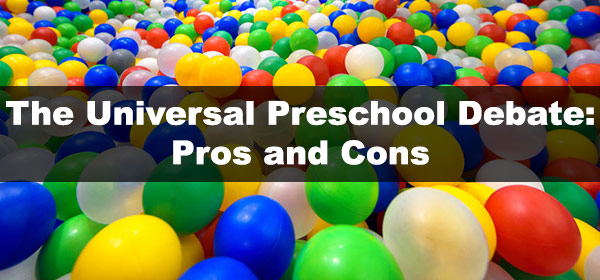The Universal Preschool Debate: Pros and Cons
There is no secret that the cost of daycare around the country can be quite expensive, and many working parents often struggle to find affordable care for their children. While private childcare remains to be the primary option available in many areas of the U.S., cities like Washington D.C., New York City, Chicago, and soon Portland, have all incorporated a universal approach to preschool education.
So what exactly is universal preschool, and what are some arguments for and against it? In this article, we’ll take a brief look at some potential pros and cons to help provide a balanced look at the topic.
Viacheslav Lopatin © 123RF.com
What is Universal Preschool?
In a broad sense, universal preschool (or universal Pre-K) is a publicly funded and tuition-free program for age-eligible children (usually 3- and 4-year olds), regardless of income level or other factors. As an example, the Portland Universal Preschool legislation text provides a general idea of what such a model may entail.
Washington D.C. Public Schools (DCPS) currently enrolls over 6000 preschool students as part of their tuition-free universal pre-K initiative, and reports that more than 92% of these students are “meeting or exceeding developmental expectations.” DCPS requires that preschool teachers hold at least a bachelor’s degree, and teachers are paid a salary comparable to that of K-12 teachers.
The DCPS preschool curriculum is grounded in their established Kindergarten Readiness Standards, which focus on subjects such as Social & Emotional Development, Physical Development, Language & Literacy, Mathematical Thinking, Scientific Inquiry, Social Studies, and Creative Arts.
What Are Some Arguments in Favor of Universal Preschool?
Here are some reasons people support universal preschool initiatives:
- Pre-K access for low-income families and positive societal impact – Because of the expense of enrolling a child in a private preschool program, proponents of a universal tuition-free Pre-K structure might point out its potential to open access to include children of low-income families, which can have positive implications for societal change. According to policy analyst Darcy Ann Olson, “Most advocates of public preschool argue that early schooling of low-income children is an investment that pays off in the long term by reducing the number of children who will perform poorly in school, become teenage parents, commit criminal acts, or depend on welfare.”
- A more economically diverse preschool environment – As Halley Potter of The Century Foundation points out, universal Pre-K models can open the doors for families of a wider range of backgrounds. In turn, Pre-K classrooms can become much more diverse, both in terms of race and socioeconomic status, which, according to Potter, can result in a better learning environment and can facilitate enhanced racial tolerance in children.
- An increase in maternal labor force and employment rates – Findings from a study on the societal impacts of the Washington D.C. universal preschool measure suggest a positive effect on the maternal labor supply. Researchers of the study found that since the Pre-K measure was enacted, the maternal labor force participation rate increased by 12 percentage points, with 10 of those points being directly related to the initiative. Mothers of both low-income and high-income houses alike have become more likely to participate in the labor force, and mothers of Pre-K children had the same employment rate as mothers of K-12 children, which was not the case previous to the rollout of the local universal preschool program.
What Are Some Arguments Against Universal Preschool?
Now that we’ve looked at some of the arguments for universal preschool, let’s take a look at some reasons why some people might be apprehensive to support such a model:
- Unintended negative impact on infant care providers and affordable access to infant care – Opponents might argue that a large abundance of parents deciding to enroll their 3- or 4-year-old children in universal preschool programs can have unintended negative consequences for private childcare providers who offer care for infants. Eunice Roh of U.C. Berkeley points out that due to the resources and staffing needed to provide adequate care necessary, most private childcare providers do not profit from infant care. Instead, they rely on Pre-K children to offset the cost of infant care because providing care to older children is less resource-intensive. If a large portion of Pre-K children were to leave private daycares in favor of universal pre-K programs, this could force private daycare providers to close their business due to a lack of financial sustainability – and in turn create a struggle for families to secure affordable infant daycare.
- Potential for teacher burnout from higher standards – Depending on how individual states choose to enact a universal Pre-K legislation, some opponents might worry about the potential for early childhood teacher burnout due to increased state standards in order to maintain funding (similar to Head Start). Ashley Brooks of Rasmussen College points to a study by Nonprofit Quarterly in which early childhood teachers in New York were found to be making substantially less (with equal education and experience) than teachers in K-12 schools: “While this issue may be resolved somewhat with enough funding, this is a good example of where policy can fall flat.”
- The question of funding – One big question that many opponents of universal preschool may have is where the money will come from. Although some cities around the U.S. have increased taxes to fund universal preschool programs, opponents might be apprehensive about paying more in taxes for a public service they are not convinced will be an effective alternative to current private childcare programs.
Hopefully, this article has provided you with a balanced look at some arguments for and against universal preschool. We’d love to hear your thoughts on the topic in the comments below!

